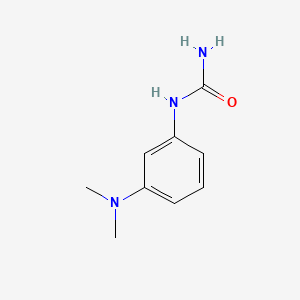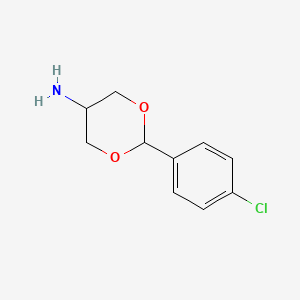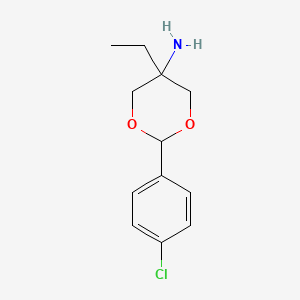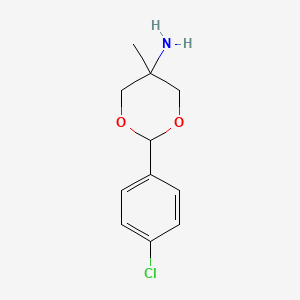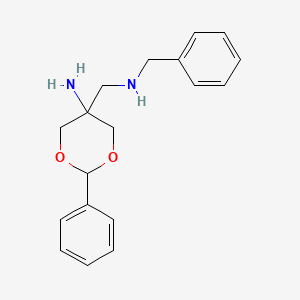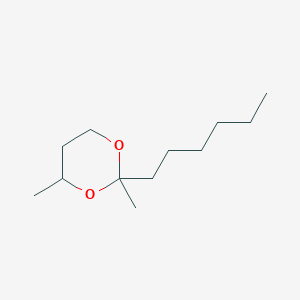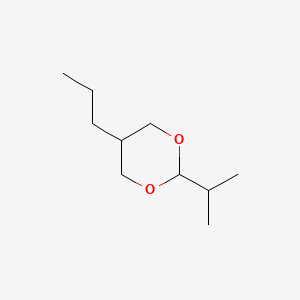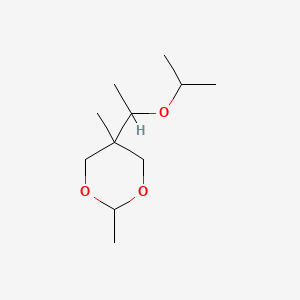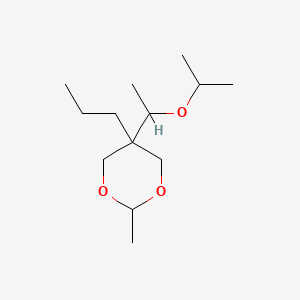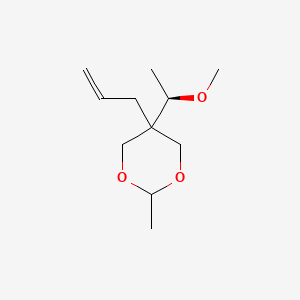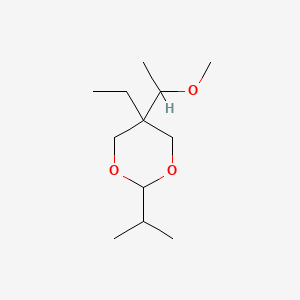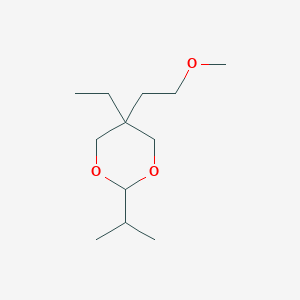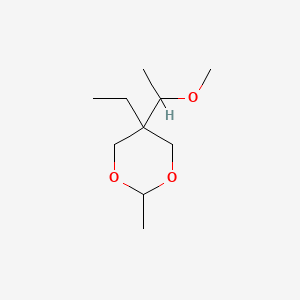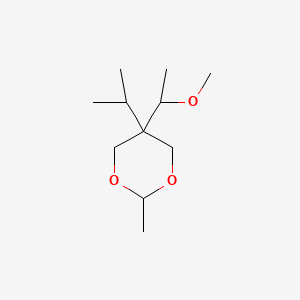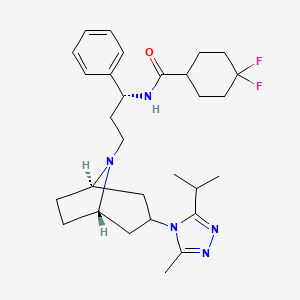
マラビロク
概要
説明
作用機序
マラビロクは、ヒト細胞の表面にある CCR5 受容体に選択的に結合することにより、侵入阻害剤として機能します . この結合により、HIV-1 gp120 タンパク質が CCR5 受容体に結合することができなくなり、ウイルスが宿主細胞に侵入することができなくなります . この薬は、CCR5 受容体の負のアロステリックモジュレーターとして作用し、受容体とウイルスの相互作用を阻害するコンフォメーション変化を引き起こします .
類似の化合物との比較
マラビロクは、ウイルスそのものではなく、ヒト受容体を標的にするため、抗レトロウイルス薬の中ではユニークです . 類似の化合物には、以下のような他の CCR5 拮抗薬があります。
ビクリビロク: 作用機序は似ていますが、薬物動態特性が異なる別の CCR5 拮抗薬です。
アプラビロク: 安全性に関する懸念から中止された CCR5 拮抗薬です。マラビロクの独自性は、その良好な安全性プロファイルと、他の抗レトロウイルス薬と組み合わせても、有意な薬物相互作用を起こさないことです.
科学的研究の応用
Maraviroc has a wide range of scientific research applications:
生化学分析
Biochemical Properties
Maraviroc selectively binds to the human chemokine receptor CCR5 present on the membrane of CD4 cells (T-cells), preventing the interaction of HIV-1 gp120 and CCR5 necessary for CCR5-tropic HIV-1 to enter cells . This interaction is crucial for the biochemical reactions involving Maraviroc.
Cellular Effects
Maraviroc, by binding to CCR5, blocks HIV from entering human cells . This influences cell function by preventing the virus from integrating into the host genome, thus preventing the production of new viral particles. This has a significant impact on cell signaling pathways, gene expression, and cellular metabolism.
Molecular Mechanism
Maraviroc is an entry inhibitor and works by blocking HIV from entering human cells . Specifically, Maraviroc is a selective, slowly reversible, small molecule antagonist of the interaction between human CCR5 and HIV-1 gp120 . This prevents the virus from fusing with the human cell membrane .
Temporal Effects in Laboratory Settings
The effects of Maraviroc have been studied over time in laboratory settings. Maraviroc is extensively metabolized by CYP3A4, with renal clearance accounting for approximately 23% of total clearance . The half-life of Maraviroc is approximately 16 hours .
Metabolic Pathways
Maraviroc is extensively metabolized by CYP3A4 . This enzyme plays a crucial role in the metabolic pathway of Maraviroc. The major metabolic pathways of Maraviroc involve oxidation and N-dealkylation .
Transport and Distribution
Maraviroc does not inhibit any of the three studied ABC transporters, and its permeability is not affected by ABCG2 or ABCC2 . Maraviroc shows affinity for human ABCB1 and the endogenous canine Abcb1 expressed in MDCKII cells . This suggests that ABCB1/Abcb1 facilitate in situ Maraviroc transport .
準備方法
マラビロクは、さまざまな方法を使用して合成することができます。 この方法は、アミンとアルコールを、技術的に許容される条件下で直接アルキル化することを伴います . このプロセスには、高純度のマラビロクを得るための、改良された単離および精製工程が含まれます . 工業生産方法は通常、同様の合成経路に従いますが、一貫性と効率を確保するために、大規模製造向けに最適化されています .
化学反応の分析
マラビロクは、以下を含むいくつかの種類の化学反応を起こします。
酸化: マラビロクは、特定の条件下で酸化され、さまざまな酸化生成物を形成することができます。
還元: 還元反応は、マラビロク内の官能基を修飾し、その化学的性質を変えることができます。
置換: マラビロクは、ある官能基が別の官能基に置き換えられる置換反応を起こすことができます。これらの反応で使用される一般的な試薬には、酸化剤、還元剤、およびさまざまな触媒が含まれます.
科学研究への応用
マラビロクは、幅広い科学研究への応用があります。
類似化合物との比較
Maraviroc is unique among antiretroviral agents as it targets a human receptor rather than the virus itself . Similar compounds include other CCR5 antagonists, such as:
Vicriviroc: Another CCR5 antagonist with similar mechanisms of action but different pharmacokinetic properties.
Aplaviroc: A CCR5 antagonist that was discontinued due to safety concerns. Maraviroc’s uniqueness lies in its favorable safety profile and its ability to be used in combination with other antiretroviral agents without significant drug interactions.
特性
IUPAC Name |
4,4-difluoro-N-[3-[3-(3-methyl-5-propan-2-yl-1,2,4-triazol-4-yl)-8-azabicyclo[3.2.1]octan-8-yl]-1-phenylpropyl]cyclohexane-1-carboxamide | |
|---|---|---|
| Details | Computed by Lexichem TK 2.7.0 (PubChem release 2021.05.07) | |
| Source | PubChem | |
| URL | https://pubchem.ncbi.nlm.nih.gov | |
| Description | Data deposited in or computed by PubChem | |
InChI |
InChI=1S/C29H41F2N5O/c1-19(2)27-34-33-20(3)36(27)25-17-23-9-10-24(18-25)35(23)16-13-26(21-7-5-4-6-8-21)32-28(37)22-11-14-29(30,31)15-12-22/h4-8,19,22-26H,9-18H2,1-3H3,(H,32,37) | |
| Details | Computed by InChI 1.0.6 (PubChem release 2021.05.07) | |
| Source | PubChem | |
| URL | https://pubchem.ncbi.nlm.nih.gov | |
| Description | Data deposited in or computed by PubChem | |
InChI Key |
GSNHKUDZZFZSJB-UHFFFAOYSA-N | |
| Details | Computed by InChI 1.0.6 (PubChem release 2021.05.07) | |
| Source | PubChem | |
| URL | https://pubchem.ncbi.nlm.nih.gov | |
| Description | Data deposited in or computed by PubChem | |
Canonical SMILES |
CC1=NN=C(N1C2CC3CCC(C2)N3CCC(C4=CC=CC=C4)NC(=O)C5CCC(CC5)(F)F)C(C)C | |
| Details | Computed by OEChem 2.3.0 (PubChem release 2021.05.07) | |
| Source | PubChem | |
| URL | https://pubchem.ncbi.nlm.nih.gov | |
| Description | Data deposited in or computed by PubChem | |
Molecular Formula |
C29H41F2N5O | |
| Details | Computed by PubChem 2.1 (PubChem release 2021.05.07) | |
| Source | PubChem | |
| URL | https://pubchem.ncbi.nlm.nih.gov | |
| Description | Data deposited in or computed by PubChem | |
Molecular Weight |
513.7 g/mol | |
| Details | Computed by PubChem 2.1 (PubChem release 2021.05.07) | |
| Source | PubChem | |
| URL | https://pubchem.ncbi.nlm.nih.gov | |
| Description | Data deposited in or computed by PubChem | |
Retrosynthesis Analysis
AI-Powered Synthesis Planning: Our tool employs the Template_relevance Pistachio, Template_relevance Bkms_metabolic, Template_relevance Pistachio_ringbreaker, Template_relevance Reaxys, Template_relevance Reaxys_biocatalysis model, leveraging a vast database of chemical reactions to predict feasible synthetic routes.
One-Step Synthesis Focus: Specifically designed for one-step synthesis, it provides concise and direct routes for your target compounds, streamlining the synthesis process.
Accurate Predictions: Utilizing the extensive PISTACHIO, BKMS_METABOLIC, PISTACHIO_RINGBREAKER, REAXYS, REAXYS_BIOCATALYSIS database, our tool offers high-accuracy predictions, reflecting the latest in chemical research and data.
Strategy Settings
| Precursor scoring | Relevance Heuristic |
|---|---|
| Min. plausibility | 0.01 |
| Model | Template_relevance |
| Template Set | Pistachio/Bkms_metabolic/Pistachio_ringbreaker/Reaxys/Reaxys_biocatalysis |
| Top-N result to add to graph | 6 |
Feasible Synthetic Routes
試験管内研究製品の免責事項と情報
BenchChemで提示されるすべての記事および製品情報は、情報提供を目的としています。BenchChemで購入可能な製品は、生体外研究のために特別に設計されています。生体外研究は、ラテン語の "in glass" に由来し、生物体の外で行われる実験を指します。これらの製品は医薬品または薬として分類されておらず、FDAから任何の医療状態、病気、または疾患の予防、治療、または治癒のために承認されていません。これらの製品を人間または動物に体内に導入する形態は、法律により厳格に禁止されています。これらのガイドラインに従うことは、研究と実験において法的および倫理的な基準の遵守を確実にするために重要です。


